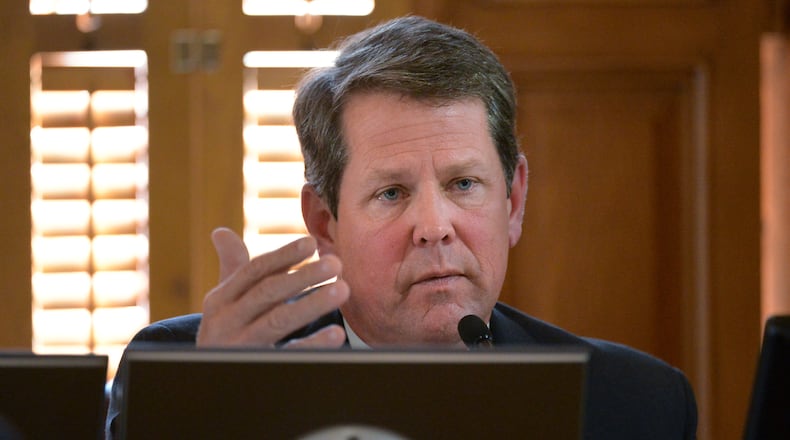Secretary of State Brian Kemp's efforts to build what he calls an "SEC" presidential primary in 2016 appear to be proceeding apace.
Kemp is working with his counterparts in Mississippi, Louisiana, Tennessee, Arkansas and Alabama to arrange a coordinated, regional primary for the first Tuesday in March 2016.
In a letter to six Southern secretaries of state, Kemp confirmed that he intends to set March 1 as the date for Georgia’s presidential primary:
"It is my hope that our region will participate together that day and that the voters of the Southeast will have a major impact in the selection of the presidential nominees of both parties."
Delbert Hosemann, the Mississippi’s secretary of state, has announced his intention to seek legislation to set March 1 as his state’s designated primary day. Tennessee, too, has designated that day for its presidential primary.
Kemp said he hopes to firm things up at a Washington gathering of his compadres in February.
***
That "For Sale" sign in the front yard of U.S. Rep. John Barrow's Augusta home is no prank. Less than a week after the Democrat's defeat by Republican Rick Allen, Barrow's home is on the market.
Barrow is a native of Athens. From spokesman Richard Carbo:
"After two Republican gerrymanders that forced him to move, Mr. Barrow made a commitment to live within the district. That, and the commute to Washington, kept him away from his family for extended periods of time. He's decided to move to be closer to his family."
***
The state House Republican Caucus meets today to re-elect officers. No turmoil is expected. The House Democratic Caucus was to meet today as well, but that meeting has been postponed. A new date will be announced tomorrow, we're told.
Senate Republicans will hold their elections – a new majority leader is the top open position – next Monday, Nov. 17. The location has not been publicly announced.
And Senate Democrats will huddle at 2:30 this afternoon to select their new slate of officers.
***
Those predictions for runoffs in the U.S. Senate and gubernatorial races would have been right -- if only advance votes were counted.
The tally of the 830,000 or so advance votes gave Gov. Nathan Deal and David Perdue slight advantages over their Democratic opponents. But neither cracked the 50 percent threshold.
It's another reason why, even with weeks of advance voting, a good campaign ground game and final get-out-the-vote effort can make or break a campaign.
***
One reason for the roughly 13,000-vote gap between Gov. Nathan Deal and Senate-elect David Perdue: About 20,000 Senate voters skipped the governor's race.
***
Overall turnout for the election was just about 50 percent of registered voters, but some counties were better than others.
Chattahoochee County, in west Georgia, had the state's worst turnout rate at just under 20 percent, though that could change as absentee or provisional ballots are tallied.
And voters in Fayette County had the highest turnout rate - a 61 percent clip.
***
In Sunday's column, we told you that the leaders of both the state House and Senate were signaling support for an increase in the state gasoline tax, to generate the cash needed by a woefully underfunded Georgia Department of Transportation.
Left out of that column, for space reasons only, was any mention of what may be the toughest part of that fight – prohibiting local governments from levying sales taxes on gasoline for non-transportation purposes.
From Edward Lindsey, the former state lawmaker and current member of the Plan B Committee, from which the recommendation for a gas tax hike is likely to emerge:
"If we are to raise the gas tax for transportation purposes, we're going to have to wean local government from the gas tax for non-transportation purposes."
***
A Washington-based political consultant with ties to Georgia pleaded guilty last week to mail fraud in federal court, reports the Philadelphia Inquirer.
Tom Lindenfeld, head of LSG Strategies, copped to a single count of wire fraud, reports the paper, for conspiring with U.S. Rep. Chaka Fattah to convert federal grant money to fund Fattah’s failed 2007 bid to become Philadelphia’s mayor.
Lindenfeld has a vast list of political clients across the country, including such prominent Georgia politicians, groups and causes as the Democratic Party of Georgia, Atlanta Mayor Kasim Reed and the failed but bipartisan T-SPLOST campaign. Our AJC colleague Katie Leslie reports that, according to state campaign records, Citizens for Transportation Mobility paid LSG Strategies tens of thousands of dollars in 2012 to conduct phone calls and field work for the failed transportation referendum.
Reed paid Lindenfeld’s group nearly $100,000 last year during his re-election campaign for “media expenses,” such as campaign ads. The mayor’s office declined comment on Friday.
When Lord demanded his money back amid the financial crisis, Fattah orchestrated a series of shuffles to tap into the account of a federally funded nonprofit and route the money through two intermediaries, including Lindenfeld's consulting business, and back to the donor. Lord faces no charges.
The second scam involved Fattah's winning congressional approval for a $500,000 grant to Lindenfeld's "Blue Guardians," which supposedly was going to help low-income communities in the Caribbean and along the Atlantic Coast.
About the Author



